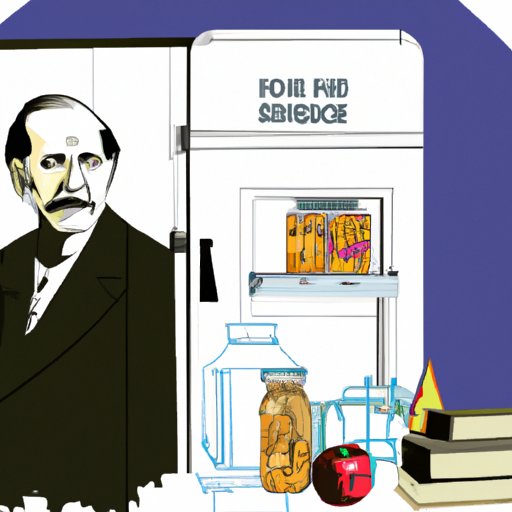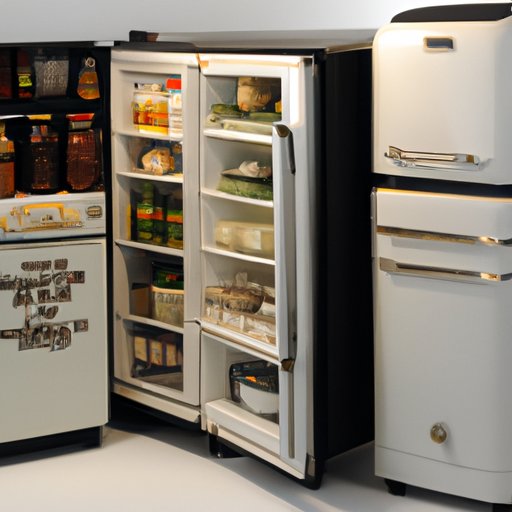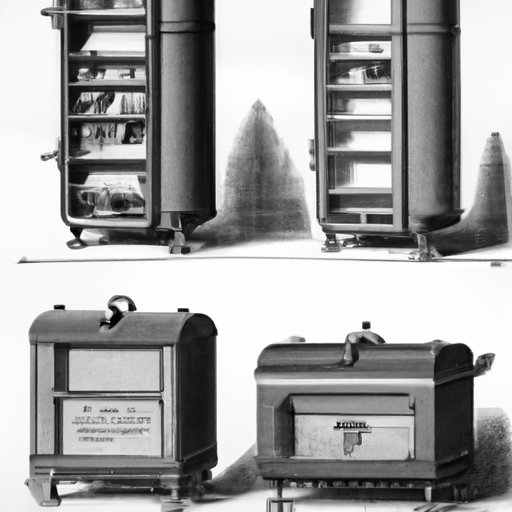Introduction
A refrigerator is an essential appliance found in almost all households today. But when was the fridge invented? This article will take a look at the fascinating history of the refrigerator, from its early beginnings to modern-day technology. We’ll explore the inventors who revolutionized food preservation, as well as the evolution of refrigeration technology over time and its impact on the way we eat.
Historical Timeline of the Refrigerator: From Invention to Modern Day
The history of the refrigerator can be traced back to early forms of refrigeration techniques used by ancient civilizations, such as storing food in snow and ice or using evaporative cooling. The development of mechanical refrigeration in the 19th century led to the emergence of the home refrigerator in the early 20th century. Since then, the technology has continued to evolve, with advances in energy efficiency, refrigerants, and other technological innovations.

The Fascinating Story of How the Refrigerator Came to Be
The invention of the refrigerator can be attributed to the work of several inventors over the course of many years. Early experiments in refrigeration were conducted by scientists like Oliver Evans and Jacob Perkins, who developed machines that used vapor compression systems. Their work eventually led to the development of the compressor-based refrigerator, which became popularized in the early 20th century.

The Inventor Who Revolutionized Food Preservation: The History of the Refrigerator
One of the earliest pioneers of refrigeration technology was Oliver Evans, an American engineer who designed a refrigeration machine in 1805. His machine used a vacuum pump to create a low-pressure environment, which allowed for the evaporation of water and the cooling of air. Unfortunately, his invention was not widely adopted at the time.
Another notable inventor in the history of the refrigerator is Jacob Perkins, an American inventor who developed a vapour compression system in 1834. His machine used a compresser to circulate a cooling agent around a sealed vessel, allowing for the cooling of air without the need for a vacuum. This invention was the precursor to modern-day refrigerators.
Finally, in 1876, German engineer Carl von Linde developed a more efficient refrigeration technology using a gas-compression cycle. This technology was adopted by companies like General Electric, which began to produce home refrigerators in the early 1900s. By World War II, the refrigerator had become a staple in most American households.
A Brief Overview of Refrigeration Technology and its Evolution Over Time
In the early days of refrigeration, toxic substances like ammonia and methyl chloride were used as refrigerants. As refrigeration technology advanced, new and safer refrigerants were developed, such as chlorofluorocarbons (CFCs) and hydrochlorofluorocarbons (HCFCs). Today, the most common refrigerant is hydrofluorocarbon (HFC), which is non-toxic and non-ozone depleting.
In terms of energy efficiency, modern refrigerators are much more efficient than their predecessors. According to the U.S. Department of Energy, the average refrigerator manufactured in the 1970s consumed about 1,500 kWh per year, while today’s models consume only about 250 kWh per year. Technological advances have also made it possible for refrigerators to come with features like temperature sensors and humidity control.

Refrigeration Through the Ages: How the Refrigerator Changed the Way We Eat
The invention of the refrigerator revolutionized the way we store, prepare, and consume food. Before the invention of the refrigerator, food had to be preserved through methods like salting, smoking, and pickling. The advent of the refrigerator made it possible to store food for longer periods of time, reducing spoilage and waste.
The refrigerator also changed the way we prepare food. With the help of a refrigerator, food can be cooked in advance and stored until ready to be served. This has made meal preparation easier and faster, allowing us to enjoy freshly cooked meals even when we’re short on time.
Finally, the refrigerator has changed the way we consume food. With the ability to store food for longer periods of time, we’re now able to enjoy a variety of foods year-round, regardless of seasonality. This has greatly expanded our culinary options, giving us access to a wider range of ingredients and flavors.
Conclusion
The refrigerator is one of the most important inventions in history, revolutionizing the way we store, prepare, and consume food. Its invention can be attributed to the work of several inventors over the course of many years, from Oliver Evans’ early experiments in refrigeration to Carl von Linde’s development of the compressor-based refrigerator. Refrigeration technology has continued to evolve over time, with advances in energy efficiency and refrigerants, making the refrigerator an essential part of every household.
For further research, check out the U.S. Department of Energy’s website (https://www.energy.gov/energysaver/appliances/refrigerators), which provides information about refrigerator energy efficiency and tips for saving energy.
(Note: Is this article not meeting your expectations? Do you have knowledge or insights to share? Unlock new opportunities and expand your reach by joining our authors team. Click Registration to join us and share your expertise with our readers.)
